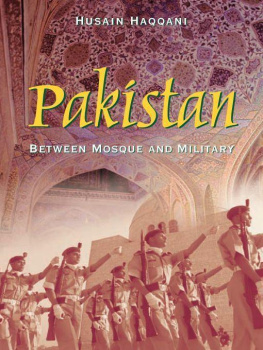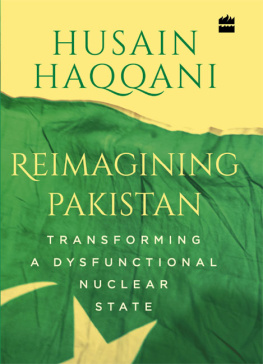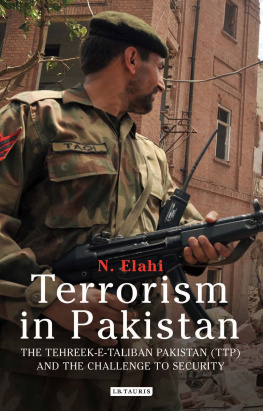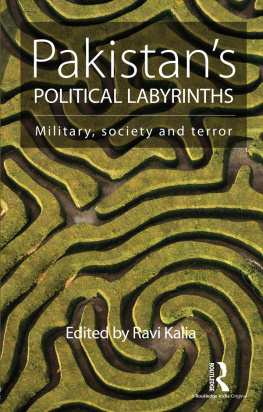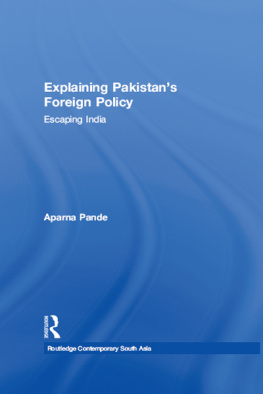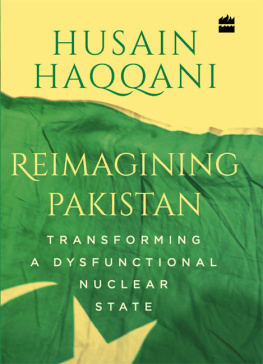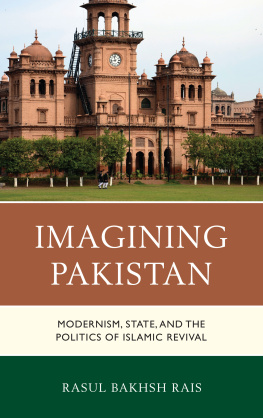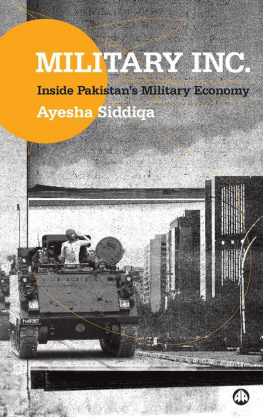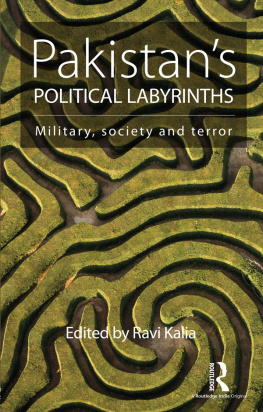Table of Contents
Praise for Pakistan: Between Mosque and Military
A very valuable addition to the existing literature.
International Affairs
Taking years of first-hand experience of Pakistani politics, Haqqanis narrative weaves disparate strands into an informative and authoritative tale.
Far Eastern Economic Review
For gaining a grasp of the situation and its implications for the United States, there may be no better place to begin than Pakistan: Between Mosque and Military .
Commentary
In Pakistan, a nation that the United States has been happy to use without ever bothering to understand, the global war on terror will be won or lost. In this cogent, well-informed and extraordinarily informative book, Husain Haqqani describes in detail the unholy alliance between Islamists and military officers that has shaped Pakistans past and may well determine its future. An important and disturbing tale, deftly told.
Andrew J. Bacevich ,
Author of The New American Militarism: How Americans
Are Seduced by War
Husain Haqqani has seen Pakistani politics close up. But his book is much more than a memoir: Haqqani has produced a provocative and controversial history revealing the depth of the links between the army and the Islamic radicals. Required reading.
Owen Bennett-Jones , BBC,
Author of Pakistan: The Eye of the Storm
We are in Husain Haqqanis debt for providing the authoritative account of the linkages between Pakistans powerful Islamists and its professional army. He conclusively demonstrates that these ties are long-standing, complex, and very troubling. This brilliantly researched and written book should be required reading for anyone who wishes to understand this increasingly important state.
Stephen P. Cohen , Brookings Institution,
Author of The Idea of Pakistan and The Pakistan Army
Husain Haqqani has written the most comprehensive account of the role of religion and the army in Pakistans tangled history. It makes for fascinating and sobering reading. The challenge of maintaining a moderate Islamic identity at a time of national insecurity and religious passion remains one of the central problems confronting any Pakistan government.
Teresita Schaffer , CSIS,
Former U.S. Ambassador and Assistant Secretary of State for South
Asia
2005 Carnegie Endowment for International Peace. All rights reserved.
No part of this publication may be reproduced or transmitted in any form or by any means without permission in writing from the Carnegie Endowment.
Carnegie Endowment for International Peace
1779 Massachusetts Avenue, N.W., Washington, D.C. 20036
202-483-7600, Fax 202-483-1840
www.CarnegieEndowment.org
The Carnegie Endowment for International Peace normally does not take institutional positions on public policy issues; the views and recommendations presented in this publication do not necessarily represent the views of the Carnegie Endowment, its officers, staff, or trustees.
To order, contact Carnegies distributor:
The Brookings Institution Press
Department 029, Washington, D.C. 20042-0029, USA
1-800-275-1447 or 1-202-797-6258
Fax 202-797-2960, E-mail bibooks@brook.edu
Composition by Stephen McDougal
Printed by United Book Press
Library of Congress Cataloging-in-Publication data
Haqqani, Husain, 1956-
Pakistan : between mosque and military / Husain Haqqani.
p. cm.
Summary: This book analyzes the origins of the relationships between Islamist groups and Pakistans military, and explores Pakistans quest for identity and security. Tracing how the Pakistani military has sought U.S. support by making itself useful for concerns of the moment, author Husain Haqqani offers an alternative view of political developments in Pakistan since the countrys independence in 1947Provided by publisher.
Includes bibliographical references and index.
ISBN-13: 978-0-87003-223-3 (cloth)
ISBN 10: 0-87003-223-2 (cloth)
ISBN-13: 978-0-87003-214-1 (pbk.)
ISBN-10: 0-87003-214-3 (pbk.)
1. Civil-military relationsPakistan. 2. Islam and politicsPakistan. 3. PakistanArmed ForcesPolitical activity. 4. United StatesMilitary relationsPakistan. 5. PakistanMilitary relationsUnited States. I. Carnegie Endowment for International Peace. II. Title.
JQ629.A38C585 2005
322.509549dc22 2005012396
10 09 5 1st Printing 2005
Foreword
Of all the United States partners in the global war on terrorism, Pakistan is the most vexing and arguably the most important. For years it has been accused of encouraging terror, through support of the former Taliban government in Afghanistan and by promoting armed opposition to Indian control of Kashmir. Following the events of September 11, 2001, however, Pakistan cast its lot with the United States, providing assistance to U.S. military operations in Afghanistan and sharing valuable intelligence. Today, Pakistan is simultaneously a breeding ground for radical Islam and a key ally in the U.S. effort to eliminate terror in South Asia and worldwide.
This ambiguous relationship is rooted in the historic alliance between Islamists and the Pakistani militarythe subject of Husain Haqqanis fascinating political history of this young, troubled state. Haqqani, a visiting scholar at the Carnegie Endowment, political commentator, and former Pakistani diplomat, examines the entire period of Pakistans statehood, from which he masterfully extracts the key factors that have shaped the contours of the countrys evolution.
Haqqani shows how perceptions of Pakistans external and domestic threats have produced a debilitating partnership of expediency between Islamists and the military. Government officials have not only used Islam to unify the multiethnic and multilingual Pakistani state, they have also used it to reinforce Pakistani identity in opposition to Indias predominantly Hindu population. Conflict with neighboring India has mainly benefited the Pakistani military, which has used its exalted status to play a decisive role in government policy, even during periods of civilian rule. Haqqani contends that while Pakistans leaders have repeatedly courted religious nationalism to advance their personal agendas, they have rarely been able to control its less desirable effects. The historic alliance between Islamists and Pakistans military has the potential to frustrate antiterrorist operations, radicalize key segments of the Islamic world, and bring India and Pakistan to the brink of war yet again, he warns.
Pakistan: Between Mosque and Military is an articulate and convincing plea for a return to civilian-led government and an end to the Islamist-military alliance. As Haqqani amply demonstrates, reliance on this partnership has stoked the flames of conflict, impeded efforts to control terrorist operations, and diverted precious resources from the countrys considerable development challenges. In doing so, Haqqani firmly rejects the view that greater democratic participation will empower Islamic extremists.
Now more than ever, the fates of the United States and Pakistan are tightly intertwined. From counterterrorism to nuclear nonproliferation, effective cooperation with Pakistan is a s ine qua non for the success of critical U.S. foreign policy goals. The harrowing discovery of the A. Q. Khan network in 2003a Pakistan-based operation that had for years been selling nuclear bomb designs and equipment to North Korea, Iran, Libya and elsewhereis only the most recent example of this troubled interdependence. Given the central role Pakistan plays in whether or not the U.S. reaches so many of its foreign policy objectives, partnership with this South Asian power is sure to be a high priority well into the future.

